Social
The socioecological framework for the field of epidemiology: aligning our work with justice and liberation Nadia Abuelezam* Nadia Abuelezam Jessie
Epidemiologists must look inward to work toward understanding how the field is shaped by recent sociopolitical events. Recent events, including the COVID-19 pandemic, Black Lives Matter, and the attacks on universities’ equity, diversity, and inclusion work in the United States, are an opportunity to re-imagine how epidemiology can better serve more diverse populations in a domestic context. The history of epidemiology is firmly rooted in a positivist epistemological framework, meaning that our science has been controlled by the idea that reality is fully quantifiable; that numbers are objective; and, most problematically, that our biases and values do not shape our quantitative work. The positivist framework has limited our opportunities to extend our methodologies, prioritize community engagement, and focus on liberation as a goal of health equity work. We present a post-positivist view of the field through the construction of a socioecological framework for epidemiology (Figure 1). We consider the roles of epidemiologists as educators, public health practitioners, and members of the broader political communities in which they work. The framework names important action and reflection points from the individual- to the cultural-level of the socioecological framework. For example, at the institutional level, we suggest implementing and supplementing communications and advocacy training at every level of public health education through bolstering Council on Education for Public Health accreditation requirements. At the cultural level, we suggest exploring the value of Indigenous research models or standpoint theory, which is the idea that knowledge is fundamentally shaped by the social and political roles of the people who create it. By presenting this framework, we aim to instigate conversations on how the field of epidemiology can more closely align with justice oriented frameworks, viewpoints, and methodologies in order to serve more diverse populations.

